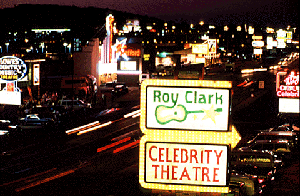GOLDSEA | ASIAMS.NET | ASIAN AMERICAN PERSONALITIES
KING OF BRANSON
PAGE 6 of 12
| "Tabuchi immediately drove to Nashville and on Friday and Saturday nights of that very week, appeared on the Grand Ole Opry." |
When they weren't working to pay the rent, Tabuchi and Nozaki and a third Japanese musician formed a band called the Osaka Okies. They even managed to get a few gigs playing at restaurant like the Hungry Eye. The band dissolved when a discouraged and homesick Nozaki returned to Japan.
"He missed Japanese food," Tabuchi recalls. "He would go eat Japanese food every meal, but I do without. I adapted pretty well. I was more determined to stick with it."
CONTINUED BELOW
The second band Tabuchi formed didn't last long either. But not all of
Tabuchi's memories of his year in San Francisco are bad. He recalls a San Jose
restaurant called the Corral Club. "The owner was very very nice to us and
he just about knew what my status was and he paid us under the table and
paid us pretty good."
Another happy memory is of a lunch restaurant in San Francisco's business
district in which Tabuchi was paid strictly by what an appreciative audience
dropped into his hat. Laughing, he recalls that the restaurant was literally
under the nose of the Immigration and Naturalization Service. One female
patron was an adjuster for a large insurance company named Mary Jo. The
two struck up a conversation. Within a couple of months they were engaged
and on their way to Kansas City, Kansas to meet her family and to get
married.
"Her family is very respectable," Tabuchi says. "Dad was a license inspector.
That's why I moved to Kansas." Mary Jo's parents, Tabuchi says, had no
reservations about her daughter marrying a Japanese. "They were all for us
except Grandfather, but he turned around okay." The two were married in
early 1968 and moved to Kansas City.
Soon after that Tabuchi, now an American citizen, got his first steady job as a
fiddler at the Starlite Club in neighboring Riverside, Missouri. That got him a
union card. Later that year he again ran into Roy Acuff who invited him to
come to Nashville. "I'll put you on the Opry," Acuff promised. Seeing his
dream so tantalizingly close, Tabuchi immediately drove to Nashville and on
Friday and Saturday nights of that very week, appeared on the Grand Ole
Opry. On both nights he received a standing ovation. It was heady stuff, and
though in years to come Tabuchi would play 25 more times on the Opry, it
didn't change the fact that in 1968 he was little more than a young musician
with novelty value, good for a couple of appearances but still a long ways
from becoming a regular.

Branson, home of Shoji Tabuchi Theater, is the world's live country music capitol.
During his brief stay in Nashville Tabuchi met another Japanese banjo player named Mike Ito. "I was walking down the street in Nashville," Tabuchi recalls. "I saw Mike walking on the other side of the street. He looked like a Japanese so I talked to him, and sure enough he was. That's where our friendship started." It turned out that back in Japan Ito had heard of Tabuchi and his bluegrass band. Ito moved to West Virginia and later settled in Dallas, Texas where he joined a progressive country rock band called the Side of the Road Gang. Ito would later become Tabuchi's closest friend in Branson.
In 1969 Tabuchi and his bride were forced to move to Wichita, Kansas where, for two years, he worked days at the St. Francis Hospital as an orderly in the radiology department. By night he played country music at the Western Swing Club.
In 1970 Tabuchi flew to Shreveport, Louisiana to audition with David Houston and the Persuaders. Having won two Grammies and scored a number-one hit called "Almost Persuaded", Houston was then one of the hottest names in country music. Tabuchi got the job at $150 a day. He soon became Houston's regular opening act. Tabuchi had the same manager as Houston, and feels he was treated well and paid better than any other member of the band. PAGE 7
| PAGE 1 | 2 | 3 | 4 | 5 | 6 | 7 | 8 | 9 | 10 | 11 | 12 |
CONTACT US
|
ADVERTISING INFO
© 1996-2013 Asian Media Group Inc
No part of the contents of this site may be reproduced without prior written permission.
